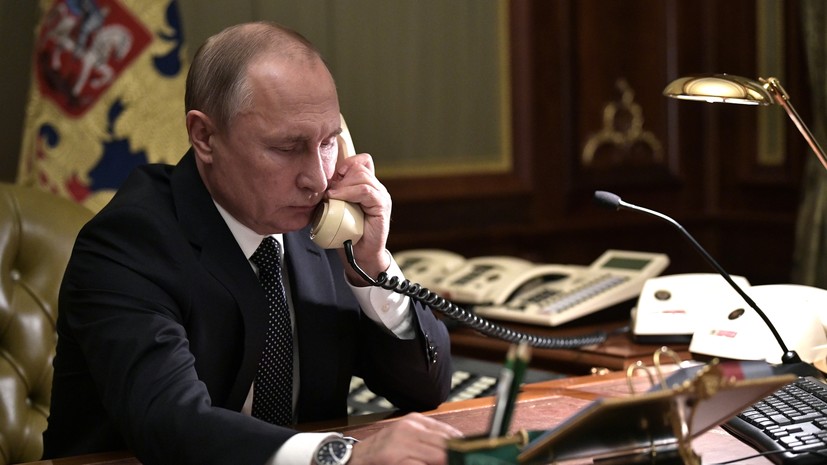Russian President Vladimir Putin held a telephone conversation with British Prime Minister Boris Johnson, during which he stated the need to immediately begin negotiations to work out clear international legal agreements that would exclude any further NATO advance eastward.
As noted in the Kremlin press service, the Russian leader also stressed that these agreements should exclude the deployment of weapons on the territories of neighboring states, primarily in Ukraine, that threaten the Russian Federation.
"The Russian side will present draft relevant documents," the statement says.
The Kremlin said that Johnson, like several other Western leaders, expressed concern about the alleged large-scale movements of Russian troops along the Ukrainian borders.
In this regard, Putin detailed to the British Prime Minister his principal assessments of the current situation around Ukraine.
In particular, he gave Johnson examples of "Kiev's destructive line on the disruption of the Minsk agreements" - an uncontested basis for resolving the crisis in Donbass.
"It was also indicated that the Ukrainian authorities purposefully exacerbate the situation on the line of contact, use heavy weapons and attack drones prohibited by the Minsk" Complex of Measures "in the conflict zone," the Kremlin stressed.
Along with this, Putin drew Johnson's attention to Kiev's policy of discrimination against the Russian-speaking population in Ukraine.
"It was emphasized that all this is happening against the background of active military" development "of the territory of Ukraine by NATO countries, which poses a direct threat to Russia's security," the Kremlin press service said.
At the same time, during the conversation, Johnson noted the contribution of Moscow to the work of the climate conference in Glasgow.
It is noted that the parties expressed satisfaction with the results of this summit of the UN Framework Convention on Climate Change.
“The British Prime Minister noted the contribution made by the Russian side to the work of the conference, as well as the meeting on forestry and land use,” the statement said.
Putin and Johnson agreed to continue the discussion of the issues raised in the telephone conversation through various channels.
Heading for confrontation
Last week, Vladimir Putin said that NATO is taking an unfriendly and confrontational position in relation to Moscow, directly declaring the Russian Federation its adversary.
According to the Russian leader, such a position is regrettable in Moscow, since the Russian side does not seek a conflict with anyone.
The President paid attention to these issues during a press conference following talks with Greek Prime Minister Kyriakos Mitsotakis.
According to Putin, NATO's eastward expansion (including at the expense of Ukraine) is a very sensitive topic for Russia, which he, in particular, discussed during negotiations with his American counterpart Joe Biden.
He stressed that this is one of the most important issues in terms of ensuring the security of the Russian Federation in the medium and even strategic perspective.
We will remind, on December 7, Putin and Biden held a conversation over a closed video link.
According to the Kremlin, Ukrainian issues and the lack of progress in the implementation of the Minsk agreements have taken a "predominant place" in the negotiations.
Speaking about the statements of a number of Western media and politicians about the “threatening” movements of the Russian military, Putin stressed that it was NATO that was the first to undertake “dangerous attempts to conquer Ukrainian territory and build up its military potential” near the borders of the Russian Federation.
The President also stressed that Moscow "is seriously interested in obtaining reliable, legally fixed guarantees, excluding the expansion of NATO and the deployment of offensive strike weapons systems in states adjacent to Russia."
In the meantime, the Russian Foreign Ministry said that if NATO and the United States do not want to respond to the Russian side's calls for security guarantees regarding the non-deployment in Europe of weapons systems previously banned by the INF Treaty, a new round of confrontation could begin.
"The lack of progress towards a politico-diplomatic solution to this problem will lead to the fact that our response will be military and military-technical," said Russian Deputy Foreign Minister Sergei Ryabkov in an interview with RIA Novosti.
He added that Russia now adheres to a unilateral moratorium on this issue.
“That is, it will be a confrontation, this will be the next round, it will be the appearance of such funds from our side.
Now they do not exist, we have a unilateral moratorium, we call for this moratorium to join NATO and the United States, - Ryabkov explained.
"Assurances ... that NATO has no intentions to deploy such nuclear weapons do not convince us of anything ... In principle, there is no trust in NATO as an alliance."

